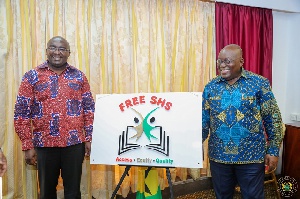The Free Senior High School (Free SHS) policy, the flagship programme of the Nana Addo Dankwa Akufo-Addo government, is often the subject of public debate, as the public appears to be divided about its benefits.
Proponents of the ruling New Patriotic Party (NPP) government often tout the policy, describing it as revolutionary because it affords every qualified Ghanaian the chance to get secondary school education free of charge. President Nana Addo Dankwa Akufo-Addo stated during the launch of the Free SHS that the main objective of the policy was to "lift the financial burden off parents and the heart-rending anxiety that accompanies the beginning of every school term."
Others, including educational think tanks, teacher unions, and other stakeholders in the educational sector, have, however, argued that although the Free SHS policy is laudable, the way it is being implemented is offsetting its intended objective of making education free for all students. They say the policy is causing more harm than good.
Often, these arguments are made without the relevant data to back the claims. This GhanaWeb researched data story put together by Ishmael Batoma, a data journalist, relies on data from the Ministry of Education, the Ghana Education Service, and a financial burden analysis of the policy by the educational think tank, Africa Education Watch (Edu Watch), and will seek to give a vivid picture of the impact of the Free SHS programme on the country.
Impact of Free SHS on Enrolment:
One of the main arguments of the Akufo-Addo government is that the Free SHS programme has increased enrolment in the country’s second-cycle institutions, and this is corroborated by the data. Total enrolment in second-cycle institutions, including Senior High Schools (SHS) and Senior High Technical Schools (SHTS) during the previous John Dramani Mahama National Democratic Congress-led government stood at 813,448 students in the last year of the government.
During the John Dramani Mahama government, over 813,000 students enrolled in government second-cycle institutions, which was more than double the 393,995 enrolments during the last year of the John Agyekum Kufuor government, as illustrated in the figure below.
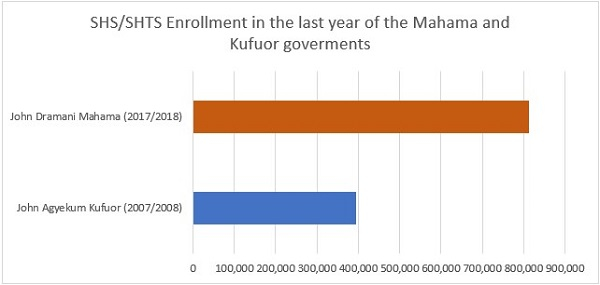
Data from the Free SHS Secretariat
The Minister of Education, Dr Yaw Osei Adutwum, has stated that over 1.4 million students are currently enrolled in various second-cycle education institutions in the country. This shows that the number of students in SHS and SHTS has increased by about 600,000 (about a 70% increment) since Free SHS started in 2017.
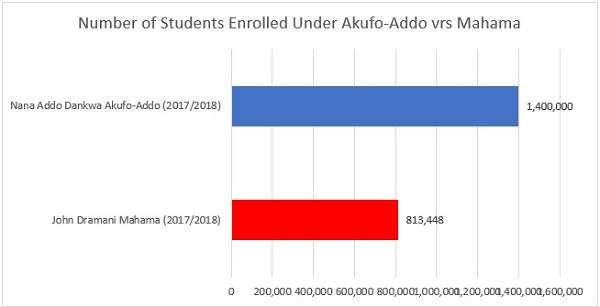
Data from the Free SHS Secretariat
More specifically, the data indicates that during the era of presidents Prof John Evans Atta-Mills and John Dramani Mahama, annual enrolment in secondary schools averaged 260,490 students. In comparison, that of the Akufo-Addo era is around 422,940 students.
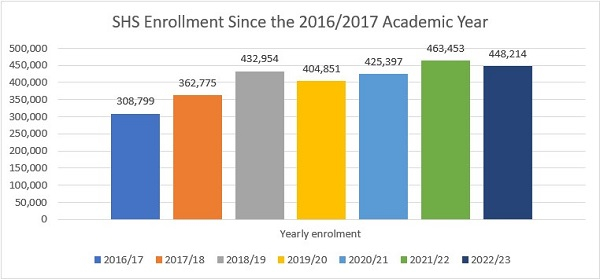
Data from EduWatch
For enrolment in Technical and Vocational Education and Training (TVET), under the era of Kufuor, 38,714 students were enrolled in government-managed public Technical and Vocational Institutions, while in the era of Mahama, total enrolment stood at 45,215.
However, for the government of Nana Addo Dankwa Akufo-Addo, after expanding the Free SHS policy from 47 Technical and Vocational Institutions (TVIs) to 139 in the 2020/2021 academic year, the enrollment of students in these schools increased significantly.
In the 2020/2021 academic year alone, 25,091 students were enrolled, and this increased to 51,560 in the 2022/2023 academic year.
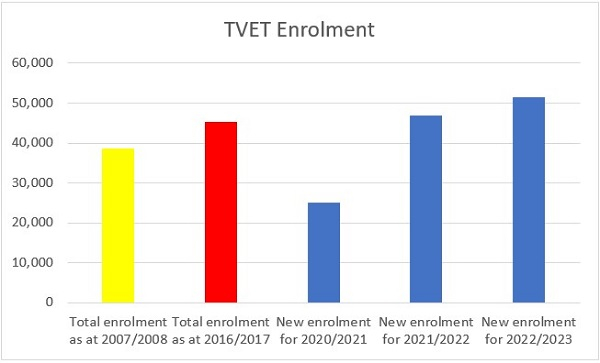
Data from EduWatch
The Ministry of Education recently disclosed that 505,489 students were enrolled into SHS, SHTS, and TVIs for the 2023/2024 academic year. Clearly, the introduction of the Free SHS programme has had a significant impact on enrolment.
The significant rise in student enrolment into second-cycle institutions is the main reason behind the various challenges encountered by the program. These challenges include insufficient infrastructure, which prompted the government to implement a double-track system in many schools.
There have also been continuous instances of food shortages, students sleeping in uncompleted buildings, and a shortage of educational materials, all of which point to a lack of proper planning before the commencement of the policy. Many critics of the implementation, including teachers, have pointed out these issues and have called for a review of the programme.
Impact of Free SHS on Government Expenditure:
Another bone of contention regarding the implementation of the Free SHS policy is the amount of money the government spends on the policy. Critics of the government's policy implementation argue that the government is allocating excessive funds to it, at the expense of other education levels, especially basic and junior high school education.
The significant rise in the number of students in government secondary schools leads to an increase in government spending, as the data clearly shows.
Before the Free Senior High School Policy was implemented, the John Dramani Mahama government, which was carrying out a 'progressively free SHS' policy, spent no more than GH₵71 million on the programme.
The Nana Addo Dankwa Akufo-Addo government has spent GH₵5.12 billion between 2017, when it started the Free SHS programme, and 2021, according to the Minister of Education. A breakdown of the over GH₵5 billion, the minister said, indicates that the government spent GH₵171.77 million in the first year of the programme when it was open to only first-year students, a graphic.com.gh report said. This increased exponentially when all enrolled students started benefiting from the policy, and in 2020, the government spent GH₵1.75 billion.
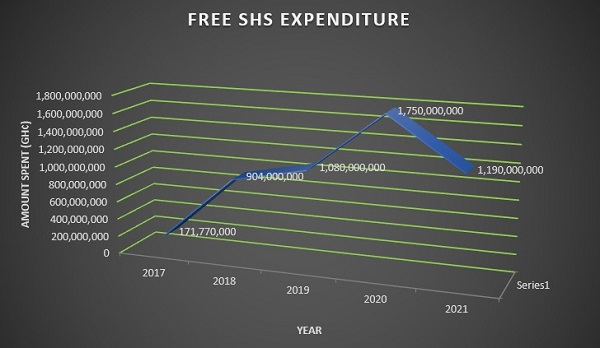
Data from the Ministry of Education
From the above, the GH₵171.77 million in the first year of the implementation of the Free SHS programme increased by over 426% to GH₵904 million in 2018. The expenditure also increased in 2019 by 19% to GH₵1.08 billion.
There was also a 62% increase from the amount spent in 2019 to GH₵1.75 billion in 2020, the highest expenditure on the programme thus far. The expenditure on the programme decreased by 32% in 2021 to GH₵1.19 billion.
Substantial expenditure on the Free SHS programme, in the face of the government's budget financing challenges, explains the shortages of food and educational materials and the poor state of infrastructure that have characterised the programme's implementation.
In fact, the difference between the amount the government budgeted for, the amount released by the Ministry of Finance, and the actual amount expended, as indicated in the table below, demonstrates the difficulties the government faces in financing the programme.

Data from the Ministry of Education
Additionally, a budget impact and budget credibility analysis, which measures the actual amount the government spent on the Free SHS programme against the amount it had budgeted for, showed that the budget for the policy was credible only for the first two years of the programme's implementation.
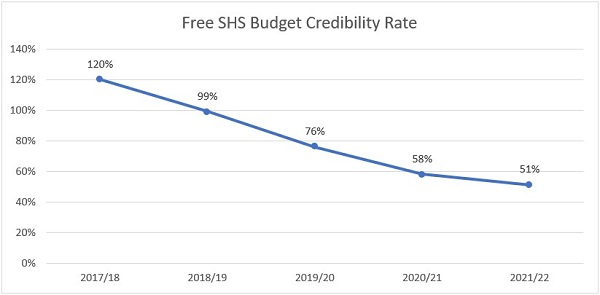
Data from the Ministry of Education
The government's expenditure on the programme in the 2017/2018 academic year exceeded its budget by about 20% (120% budget credibility rate), and in the 2018/19 academic year, the actual expenditure was almost equal to the amount budgeted (99% budget credibility rate). However, for the subsequent academic years, the budget's credibility significantly dropped to a 51% rating.
Impact of Free SHS on Parents' Expenditure on Wards:
The main aim of the Free SHS, as President Akufo-Addo himself put it, is to "lift the financial burden off parents." But has this aim been achieved since the implementation of the programme in 2017?
EduWatch's financial burden analysis of the programme revealed mixed results on how the programme affected the finances of parents or guardians. It suggested that the financial burden on parents of boarding students increased significantly, while those of day students appeared to be enjoying some respite.
Cost Incurred by Parents of First-Year Students on Prospectuses:
The data from EduWatch's study, which examined the prospectuses of 20 schools across the country, showed that the amount of monies parents paid to cover the prospectuses of their wards entering various second-cycle institutions increased significantly throughout the implementation of the Free SHS policy. The cost of the prospectus for boarding students entering SHS/SHTS and TVI increased by over 80%, from approximately GH₵1,380 on average to GH₵2,500. The cost for day students nearly doubled, from an average of GH₵640 to GH₵1,100, as illustrated in the figure below.
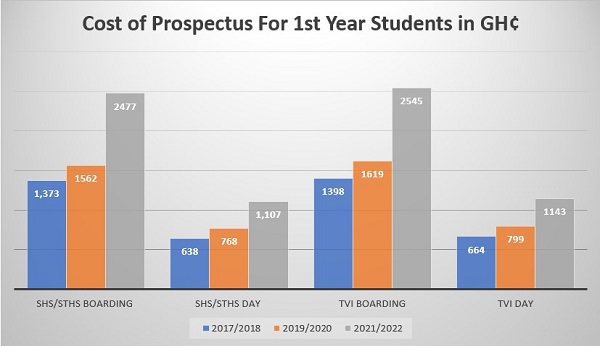
Extra Costs Incurred by Parents of First-Year Students:
Additionally, the data indicated that parents incurred additional costs aside from those on the prospectuses of their wards. About 60% of these costs was spent on non-perishable food items (provisions), 10% on transportation, 10% on books, 10% on upkeep, and 10% on personal effects.
In the first year of the implementation of the Free SHS programme, the additional cost incurred by parents was GH₵1,701, but this increased by more than 100% in the 2022/2023 academic year to GH₵4,000, as seen in the diagram below.
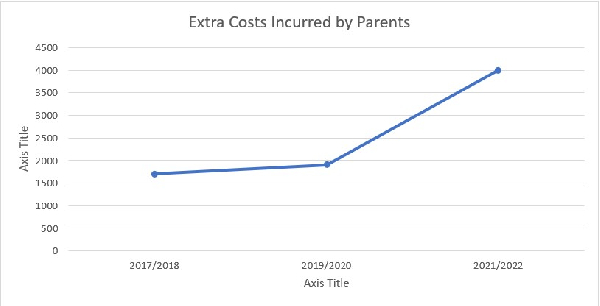
Total Costs Incurred by Parents of Continuing Students:
Furthermore, the data indicated that the additional costs borne by parents of continuing boarding house students increased throughout the policy's implementation. In the first year of the program (the 2017/2018 academic year), parents incurred an additional cost of about GH₵1,701. This amount rose to GH₵4,000 in the 2021/2022 academic year.
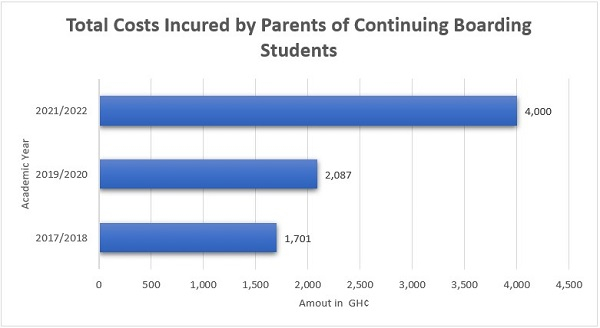
For Day Students Who Lived Close to Their Schools:
The study by Africa EduWatch found that day students who lived close to their schools did not spend any money on school-related transport. They had breakfast at home, walked to school, had free lunch at their schools, and returned home for supper.
For Day Students from Distant Communities:
However, day students from distant communities spent an average of GH₵4,400 annually, with about 40% of this expenditure spent on food, 50% on breakfast in school, and 10% on books. They also benefited from the government's free lunch in school and returned home for supper.
Additionally, day students who lived in distant communities and had to rent rooms within the vicinity of their schools, spent an average of about GH₵5,380 on hostel accommodation, feeding, and utilities annually.
Impact of the Increase in Costs Incurred by Parents:
The significant increase in enrolment in second-cycle institutions could have been even greater. Data from the Ministry of Education shows that many students placed in different second-cycle institutions in the country did not accept their placements.
Between the 2019/20 and 2022/23 academic years, around 200,000 candidates did not accept their admissions to second-cycle schools initially. For the 2019/2020 academic year, 62,149 students did not honour their admissions; for the 2020/2021 academic year, 56,354 students; for the 2021/2022 academic year, 68,872 students; and for the 2022/2023 academic year, 7,489 students.
See the table below for the differences between the number of students enrolled and the numbers that were placed into the various schools between 2019 and 2023.

The majority of parents whose children could not accept their senior high school or technical and vocational institute placements informed EduWatch that financial constraints were the main reasons for their inabilities to enrol their children. A few cited their children’s aversion to the schools they were assigned to, and others indicated that their wards were placed in SHSs rather than their preferred choices of TVIs.
The data, however, indicates that the percentage of students who could not honour their placements dropped significantly in the 2022–2023 academic year. In the 2019/2020 academic year, 15% of the placed students did not enrol; in the 2020/2021 academic year, 11% did not; in the 2021/2022 academic year, 15%; and in the 2022/2023 academic year, only 2% of the figures did not enrol.
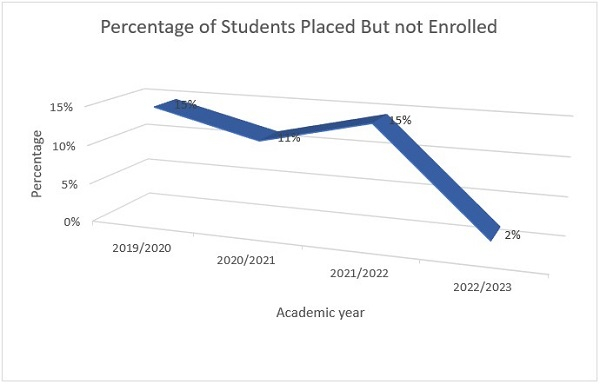
BAI/SEA/AE
Watch the latest episode of Everyday People below:
Ghana’s leading digital news platform, GhanaWeb, in conjunction with the Korle-Bu Teaching Hospital, is embarking on an aggressive campaign which is geared towards ensuring that parliament passes comprehensive legislation to guide organ harvesting, organ donation, and organ transplantation in the country.
General News of Friday, 10 May 2024
Source: www.ghanaweb.com

